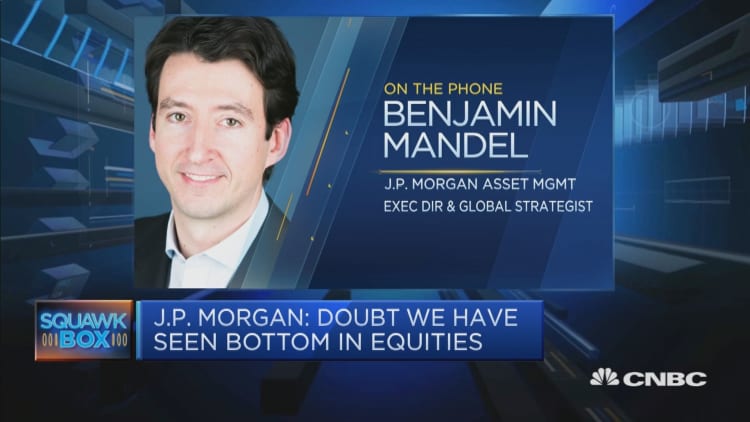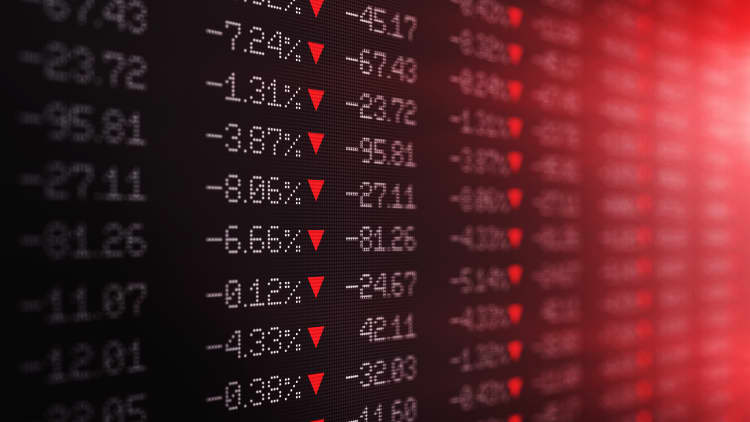In times of market downturns, many of the stocks that take a beating will eventually rebound.
Others, not so much.
For investors who have a big portion of their assets in one particular stock, the current drubbing may serve as a reminder that diversification matters. It might also be time to make sure you still believe in the company's future financial success.
"I don't think you should bail on a stock because it's going down," said certified financial planner Kashif Ahmed, president of American Private Wealth in Bedford, Massachusetts. "You should figure out why it's down.
"The underlying financials could be sound but it's being hammered by sentiment."
As the U.S. economy reels from the effects of the coronavirus pandemic, the major stock indexes have nosedived and continued volatility is anticipated. The S&P 500 index, considered a broad measure of how the nation's companies are faring, closed Thursday at 2,526, down 25.4% from its high of 3,386 in mid-February. The Dow Jones industrial average, which finished the day at 21,411, also has shed 27.6% since its high of 29,551 on Feb. 12.
While corporate forecasts continue shifting as ominous signs of further economic deterioration emerge — including a jaw-dropping spike in unemployment — some companies already were in more precarious financial positions than others. And if you're an investor who has been holding on to one of those already-battered stocks in hopes of it rebounding, you might want to consider cutting your losses.
"What if it goes to pennies or to zero?" said CFP George Gagliardi, founder of Coromandel Wealth Management in Lexington, Massachusetts. "Ask yourself how that would affect your financial situation."

Macy's may be a good example. The once-bellwether retail stock is now trading at below $5 a share, down from $72 in 2015, as it contends with nationwide store closures amid the coronavirus pandemic. Earlier this week, it was kicked off the S&P 500 after its market capitalization — the aggregate value of its outstanding stock — dropped to $1.5 billion from about $6 billion in mid-February.
If nothing else, it's an example of how even titans of industry can fall. And for the average investor, understanding the particulars of a company's financial situation and how the pieces of it fit together can be challenging at best.
"If people like their own stock-picking acumen, I have one word for you: Enron," said Ahmed, of American Private Wealth.
More from Personal Finance:
Answers to questions about coronavirus stimulus checks
Unemployment offices scramble to handle jobless claims
Which bills to pay during the coronavirus pandemic

Enron, a former energy company, collapsed and headed for bankruptcy in late 2001 as its massive, ongoing accounting fraud was brought to light. Its stock — which a year earlier had been considered a solid investment — ended up worth pennies after trading above $90 in 2000.
Of course, it doesn't take corporate malfeasance to send a stock to zero. For a variety of reasons, companies can end up with more debt than they can handle — and bankruptcy is sensible option. Sometimes they file under Chapter 7, which means they liquidate their assets, creditors collect what they can and the business permanently shuts down.
Even if the corporation doesn't go out of business — it files bankruptcy under Chapter 11, which allows it to remain operational while its debt is restructured — many hands are held out in line ahead of shareholders. Among others, that includes employees who need to continue getting paid, creditors and corporate bondholders.
At the very bottom of the hierarchy is common shareholders. Typically they get nothing.George GagliardiFounder of Coromandel Wealth Management
"At the very bottom of the hierarchy is common shareholders," Gagliardi said. "Typically they get nothing."
While selling a stock at a loss may be emotionally painful, those losses can be used to offset taxable gains elsewhere in your investment portfolio, whether now or in the future through tax-loss harvesting.
It's also a good time to remind yourself why experts generally recommend that you diversify your portfolio. From a broad perspective, you start with your asset allocation — divvying your investments among stocks and bonds, taking into consideration your risk tolerance. That's generally a combination of how long until you need the money and how well you can stomach the inevitable ups and downs of the stock market.
Yet even within each of those broader categories, your holdings should be well-diversified, many experts say. There is risk that comes with holding too much in one place — such as any one stock or bond, one sector of the economy (i.e., retail), one country, etc.
In the end, Ahmed said, diversification is about spreading risk.
"Never own too much of any one thing that could either make you a killing or cause you to be killed by it," Ahmed said.


